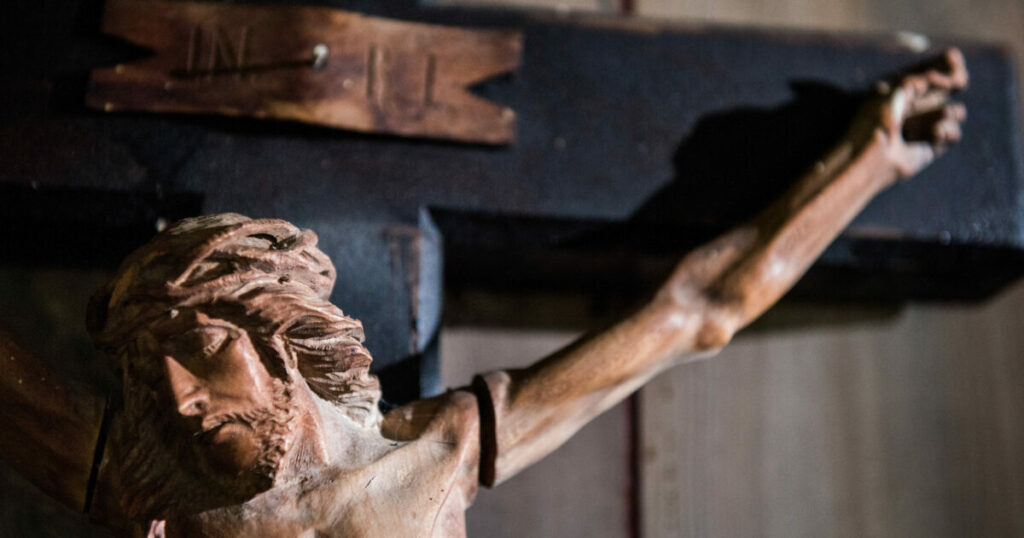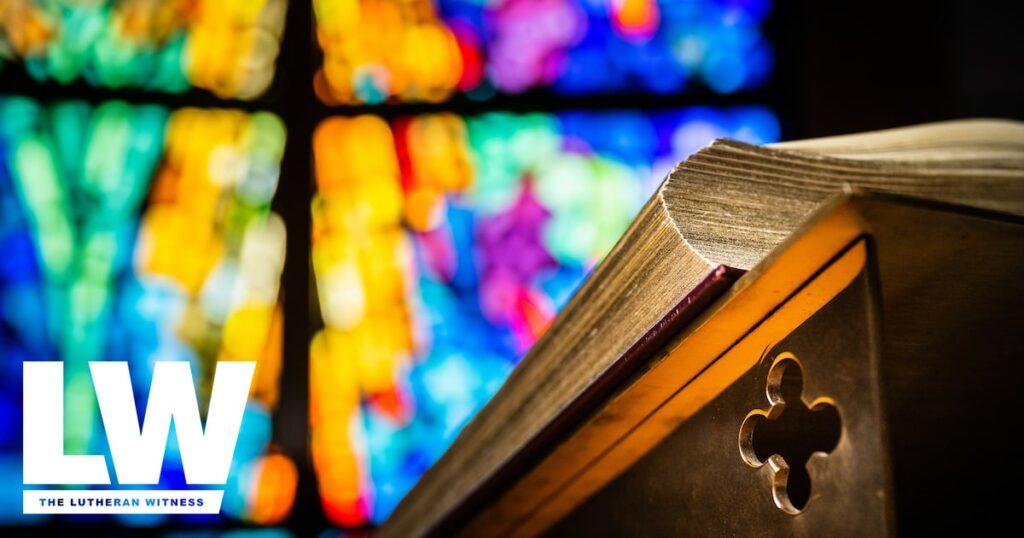by Matthew C. Harrison
“May grace and peace be multiplied to you in the knowledge of God and of Jesus our Lord” (2 Peter 1:2).
The apostle Peter informs his readers that grace and peace are abundantly, effusively, constantly given in the specific knowledge of God the Father and His only begotten Son, Jesus. The Rev. Dr. Norman Nagel, beloved professor at Concordia Seminary, St. Louis, recently passed from this world to the heavenly and joyous presence of Jesus to await the resurrection. He used to say, “When the Lord gives, He gives the whole lot.” And the Lord gives the “whole lot” for specific reasons, and by specific means.
I’ve been in many situations, mostly with Lutherans outside the LCMS, where I heard grace defined as tolerance, with little emphasis or connection to Christ’s cross, or the delivery points of grace as the divine favor of God, in Word, Absolution, Baptism and Supper. I’m thankful for LCMS people who both confess the clear grace of God in Christ and are highly motivated by that grace to serve their neighbors by loving them and sharing Christ.
Grace — the free favor of God — is a result of the work of Christ. That’s why it’s certain. The apostle John wrote, “The blood of Jesus his Son [i.e., man and God] cleanses us from all sin” (1 John 1:7). John the Baptizer pointed to Jesus and said, “Behold, the Lamb of God, who takes away the sin of the world” (John 1:29).
In the Old Testament, the animal sacrifices really did forgive sins, but only in view of the coming and ultimate sacrifice of God in the flesh on the cross. “It is the blood that makes atonement by the life” (Lev. 17:11). Hebrews says, “without the shedding of blood there is no forgiveness of sins” (Heb. 9:22). Then the writer lets us know that Christ is the be-all and end-all of all sacrifices. “He has appeared once for all at the end of the ages to put away sin by the sacrifice of himself” (Heb. 9:26). This once-for-all sacrifice of Jesus was for us, and indeed for all. “The Lord has laid on him the iniquity of us all” (Is. 53:6). “He made him to be sin who knew no sin” (2 Cor. 5:21).
Paid in full
Because of verses like Rom. 4:25, which states, Christ “was delivered up for our trespasses and raised for our justification,” and 2 Cor. 5:19, “In Christ God was reconciling the world to himself,” we have spoken of an “objective” justification. That is, a divine judgment was rendered in the death and resurrection of Christ. All sins of the whole world have been paid for, and the price was Christ’s bloody death then and there. The world has been “justified” according to the New Testament. This means that the most important thing in Christianity is not how I feel about Jesus, or came to believe in Jesus, or my experience of Jesus (though all these things are certainly not unimportant). Christianity is not ultimately or primarily focused on me, my deeds, my experience, my sincerity. All things focused on me will falter and are imperfect (Rom. 7).
The big thing is the cross and resurrection. Everything for my salvation, and the salvation of the whole world, Jesus accomplished in Jerusalem some 2,000 years ago. One of my seminary professors explained it this way: If someone puts a million dollars into a bank account for you and you simply refuse to believe it, and thus gain no benefit from it, it does not mean that the money’s not there! Faith is simply recognizing the facts, and the bank card is the means to get at the fortune! The world has been reconciled to God in Christ, believe it or not. That makes our task of sharing the Gospel simple. It’s about telling folks they’re broke (repent!), but they’ve got a treasure with their name on it. “Here! It’s yours! It’s done! Believe it!” If by the power of the Word they believe, they have immediate access (Eph. 2:8–9; Acts 13:48) to complete forgiveness and peace of conscience. If by the stubbornness of their wretched human will and the will of the devil they refuse, they walk away from the treasure (Acts 13:46).
Happy exchange
And there’s more. Grace is certain. St. Paul describes an exchange that occurs. The Bible teaches that Christ is our righteousness and more (Jer. 23:6)! “And because of him you are in Christ Jesus, who became to us wisdom from God, righteousness and sanctification and redemption, so that, as it is written, ‘Let the one who boasts, boast in the Lord’” (1 Cor. 1:30–31). What did Christ get from us? “The Lord has laid on him the iniquity of us all” (Is. 53:6).
Luther said our relationship with Christ is like a marriage. Each spouse receives everything of the other, good and bad, debt, family, money, property, you name it. Luther called our relationship with Christ in faith a “happy exchange.” He suffers my sin, punishment, death, hell. I get His payment for my sins, His sinless birth, life, good works, Baptism, suffering, agony, death, resurrection and eternal life, indeed His sinlessness, and His perfect relationship to the Father, all credited to my account! Happy exchange indeed!
If this is true, and it is, then my salvation is as certain as Christ, because everything Christ did is mine! You see, it’s blasphemous to say, “Yes, I believe in Christ, but I don’t know if I’m really going to heaven.” In fact, no one could say such a thing if he or she truly understood the nature of the Gospel as Christ giving us “the whole lot.” People who are not sure of eternal life are not sure of Christ. They are looking at themselves, not Christ.
Behold the Lamb
Do you suppose when John pointed to Jesus and shouted, “Behold, the Lamb of God, who takes away the sin of the world” (John 1:29), he wanted people to be in doubt? They knew full well what happened to the perfect lamb once a year. The people’s sins were confessed over its head by the high priest. It was slaughtered, and its blood sprinkled in the Holy of Holies in the temple for forgiveness. The people knew full well that the blood of the Passover lamb was used to mark the door of the Israelites in Egypt, so that the angel of death would pass over and not kill their firstborn! We sing in Luther’s Easter hymn:
Here our true Paschal Lamb we see,
Whom God so freely gave us;
He died on the accursed tree —
So strong His love — to save us.
See, His blood now marks our door;
Faith points to it; death passes o’er,
And Satan cannot harm us.
Alleluia! (LSB 458:5)
The Means of Grace
Grace is as certain as Christ’s life, death and resurrection. And that grace is even more certain because the Bible tells us where this free favor of God, this forgiveness, is found. I’ve heard people say, “Pastor, my church is the golf course. I worship God there!” I respond, “Hey, that’d be great if only God would have tied the forgiveness of sins to a golf club!” But He hasn’t. He’s tied it to His Word, preached and read (faith comes by hearing — Rom. 10:17); to Baptism (Baptism now saves you — 1 Peter 3:21; Titus 3:5); to Absolution (if you forgive the sins of any, they are forgiven them — John 20:23); and to the Lord’s Supper (given and shed for you for the forgiveness of sins — Matt. 26:28). Only a fool would despise these gifts. God help and have mercy upon us sinners and all for whom we pray, and all to whom we speak the Gospel.
The babe whose birth we celebrate came to give us grace. And He wants us to be completely certain of it, because it rests totally on Him.
-Pastor Harrison






“For we are [God’s] workmanship, created in Christ Jesus for good works, which God prepared beforehand, that we should walk in them.” Ephesians 2:10 ESV
Amen and Amen. Praise to our Risen Lord!
Excellent! Thank you.